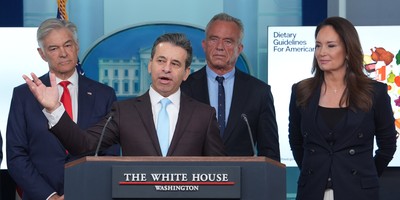Who would have thought that sweltering night in Atlanta's Omni back in 1988 that Bill Clinton would ever be asked to deliver another nominating speech at a Democratic national convention?
It was the young governor's debut on the national scene, his introduction as a rising star of his party, his opportunity to make a first impression. And, boy, did he. But it wasn't a good one. The speech was a fiasco, a 33-minute bore that drew not cheers but jeers from a convention eager to nominate its presidential candidate. Instead, it got Bill Clinton at his windiest.
The most welcome phrase in the young governor's speech turned out to be "In conclusion. . . ." At which the restless audience, having run out of patience some time before, broke into cheers and applause.
What a fiasco. This was going to be Bill Clinton's moment of glory. And he knew it, which may be why he packed every applause line he could think of into that rhetorical Titanic, and of course the overloaded thing sank.
It's a common enough mistake among amateur orators, to confuse length with eloquence, and the young governor paid the price. The speech that was going to make him almost undid him.
Call him by politics obsessed. Anybody he's ever cornered and subjected to some detailed replay of a long-forgotten political campaign, complete with voting results and Key Turning Points, will know how those convention delegates felt -- bored beyond tears and just wanting this person to go away. Their desperation showed as the convention hall rang with boos and catcalls.
Recommended
. .
What a letdown. A nominating speech at a national convention is supposed to be a great showcase for a future presidential prospect. A speaker with an eye for the main chance is able to showcase himself rather than the nominee, the way a still young Franklin D. Roosevelt did in 1928. He would soon become known as the Happy Warrior. He had used the sobriquet in reference to the party's fated-to-lose nominee that year, Al Smith, but had to know it would become his own.
Much like the young FDR at Houston in 1928, Bill Clinton was going to steal the show that night in Atlanta in 1988. He'd have everybody talking about him. Unfortunately, he did. But instead of a rising star, he looked like a falling one, flaming out even before he'd really risen.
. .
By next morning, he had become the butt of coast-to-coast jokes. But you know Bill Clinton. He bounces back. By now he's had more comebacks than the Rolling Stones, Van Halen, Bruce Springsteen and Jerry Brown put together. You can't keep him down, which is one of his most likable qualities. He exudes life and a real joy in it. The Comeback Kid may long ago have become the Comeback Geezer, but his rebound in 1988 had to be one of his most impressive.
Within hours, or maybe days at most, Bill Clinton was packing his sax and arranging to appear on the Johnny Carson show, thanks to his friends in showbiz. It worked. Not because of any musical talent, but largely because he showed he, too, could laugh at that rambling disaster he'd delivered in Atlanta. And he was soon back in the national spotlight, this time favorably.
You've got to admire anybody who can recover from a fall like that -- and with the immediate, almost instinctive resilience of one of those rolypoly bounceback dolls.
The big guy -- the Big Creep, as Monica Lewinsky once called him -- may have his foibles. But his sins, maybe with a couple of notable exceptions, are venial, not mortal. Sins of the flesh rather than soul. They tend to reveal not a shortage of humanity but an excess of it. Maybe that's why, despite all the scandals of his presidency, including that unfortunate business about impeachment, he has emerged as a popular figure. A former president folks are fond of. It may be the former that helps most.
It's no wonder Bill Clinton has been invited back, more than two decades after his debacle in Atlanta, to nominate Barack Obama next month at the party's convention in Charlotte. And it was a good choice. Or at least a savvy one.
Americans may not miss Bill Clinton so much as they do the boom times he presided over in the 1990s, at least before the dot-com bust. He's become identified with happy days. Much the way the country came to miss Calvin Coolidge after he'd handed the reins over to Herbert Hoover and disaster. It wasn't Silent Cal the country missed so much as the Roaring Twenties he'd come to symbolize.
Bill Clinton now benefits from the same selective American memory. Never mind that his great reforms -- a balanced budget, welfare reform -- were due to a happy collaboration with the Republican majority in Congress, a marriage of necessity made after the watershed 1994 elections.
But he learned from defeat, soon declaring that "the era of big government is over." Under the president he is about to nominate for a second term, big government has come back with a fiscal vengeance. The current occupant of the White House shows no inclination to learn from his political excesses. On the contrary, Barack Obama is doubling down on big government in this presidential campaign, having forsaken balanced budgets long ago. Now he's undermining welfare reform by issuing waivers to states, one of his favorite ways around the law.
But who cares? For one glorious night, we'll be back in the glittering bubble that was the Roaring Nineties. Even if outside the arena, happy days aren't here again.

























Join the conversation as a VIP Member